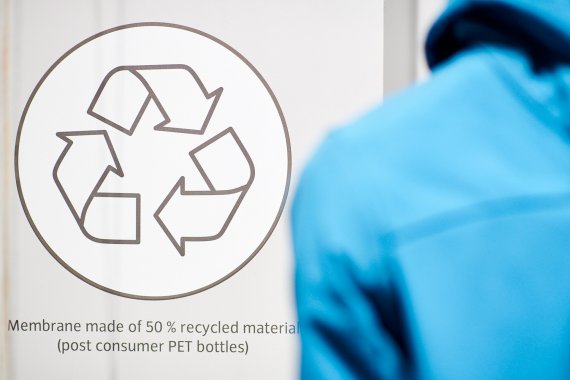
- Neo-ecology is having an increasing influence on the sporting good industry
- Future mobility and digital solutions for greater consumer consciousness
- ISPO Munich (January 26 to 29) to showcase future trends and developments
What’s more, the changes across the major urban outdoor trend are interesting: Born of a sense of longing for more nature in inner cities, the trend is now synonymous with more sustainable lifestyles and the feeling of being surrounded by nature right in the heart of the city. Urban outdoor has evolved into a solid marketplace and continues to show nothing but strong upward trends. At ISPO Munich (January 26 to 29, 2020), trade visitors will gain a comprehensive overview of current and future trends.
Researchers at the Zukunftsinstitut (Future Institute) believe that neo-ecology will be the most significant megatrend of the 2020s. The consumer trend will become an important part of the economy, and an individual philosophy of life will become a global identity. Many years ago, the U.S. American manufacturer of thermally insulating fibers, PrimaLoft, decided to dedicate itself to the development of sustainable functional fabrics. Jochen Lagemann, Senior Vice President/Managing Director Europe & Asia PrimaLoft, says: “A major area which, in our opinion, will play a key role in the future, is the circular economy. We have been carrying out R&D work in this area for some time already. Recent independent tests have shown that our PrimaLoft Bio fibers are renewable in the true sense of the circular economy. During this process, polyester is broken down into its constituent parts which can then be fully processed into a new base substance for technical materials without any loss in performance – over and over again.” Lagemann is also proud of the fact that, for example, the Primaloft-P.U.R.E. (Produced Using Reduced Emissions) manufacturing process has been able to reduce CO2 emissions by up to 48 percent compared to production methods in which thermally insulating fibers are bound together using heat from thermal ovens.
Another company that has been making good headway and leading the way in terms of sustainability over the last few years is the Norwegian clothing brand Bergans. With the Finnish biodegradable fiber manufacturer Spinnova, they have set themselves the goal of further developing cellulose-based textile fibers together. The first achievement of this collaboration is their “Collection of Tomorrow | future.labs.05.A”. The rucksack which features in the collection actually won the ISPO Award in the Sustainability category.
The Condor “post-petroleum” running shoe from French brand Veja was named “Product of the Year”**. Over a development period spanning four years, Veja managed to produce a running shoe made to 53 pecent from natural or recycled materials such as sugar cane, banana oil and rice waste. The company plans to drive these types of developments further. All of the plastic used in Jack Wolfskin’s new Ecoloader rucksacks is 100 percent recycled material. However, the really great thing here is that the padding in the back and the shoulder straps is made from BLOOMFOAM algae foam. In addition to boasting impressive cushioning properties, the natural foam is also produced using a great manufacturing method: the algae clean the water which can be fed into the natural cycle as potable water.
The Zukunftsinstitut (Future Institute) believes that the growing importance for many people of sharing a sense of community is another trend, as are people’s interest in regional products and fair-trade practices. These are areas which are also playing an increasing role in the sports industry, as demonstrated by Endasportswear.com from Kenya. This startup was named the winner of the Body & Mind category by the ISPO Brandnew jury and is a shining example of the 2020 trends: Produced locally, the Enda Lapatet running shoe was designed in cooperation with Kenyan athletes. The newcomer has confidently burst onto the scene claiming to have the lightest, most comfortable and affordable shoe in its class and also plans to contribute to the economic development of the African nation.
Trend researchers believe that bikes will be one of the most important everyday objects in the future. More and more people are relocating to towns and cities. In a bid to ensure their own mobility, make a positive contribution to the environment and improve their own health, urban residents are using (electric) bikes. The magic formula for the future here is smart mobility. The startup Cowboy has been named the ISPO Brandnew winner in the Future Mobility category on account of the fact that the innovative Belgian inventors have taken the connected bike to the next level as all of the “2019” model’s functions are controlled and monitored via an app: from anti-theft protection and battery life through to activation of the integrated lights and navigation.
The U.S. startup Awayco has invented an app designed to inject new life into the rental sector and sustainably tackle waste and overconsumption. The ISPO Brandnew winner in the Connected Sports category has already integrated 20,000 high-quality bikes as well as items of winter sports equipment and surfing gear into its app for over 150 locations. Customers can book items and make payments via the app and retailers can use it to boost their online presence.
ISPO Award winner iVibe is firmly focused on the health megatrend with its Insole 1.0, a vibrating insole made in Germany. The vibrating plates are operated online via an app in which exercises and training goals can also be recorded and directly loaded into Google Fit or Apple Health.
Born of a sense of longing for more nature in inner cities, urban outdoor is now synonymous with more sustainable lifestyles and the feeling of being surrounded by nature right in the heart of the city. Urban outdoor has evolved into a solid marketplace and continues to show nothing but strong upward trends. Eric Yung, Vice-President International at Polartec, refers to the combination of functionality and fashion as “casual tech” and believes this is an area which not only has the power to unlock massive potential but which already constitutes a real and solid marketplace in its own right. It is a consequence of changing consumer behavior. Yung says: “Young consumers are increasingly on the look-out for clothing made from technical and versatile fabrics that they can wear for lots of different types of occasions. We are currently working with lots of exciting brands such as bleed clothing, Yeezy, BonneGueule, Banana Republic, Champion, Fila, Moncler, Bailly, Diadora, and Acronym.”
Founded in 2018, Berlin-based label mvdham combines design with functionality and re-interprets urban outdoor clothing – especially for female urbanites. The fledgling German label uses only natural fibers, as is the case with LAPALUE, a padded two-layer fabric made from silk and wool, developed in-house. mvdham’s concept clinched it the ISPO Brandnew award in the Urban Outdoor category. Adidas has impressively managed to strike a fine balance between functionality and fashion with its TERREX PrimaLoft Parley anorak “made with the Loop Creation process”: Style, combined with functionality and the sustainable production process using upcycled plastic waste from the world’s oceans, earned the anorak the Gold Winner spot in the ISPO Award Urban Lifestyle category.
Italian ski apparel label Spyder intends to bring some of the glamour of the slopes to the streets. Felix Burmann, Sales Manager Europe at Spyder, says: “We have developed a separate “Mountain to Metro” collection, which combines style with functionality but also brings the ski look to the city streets.”
U.S. technology brand Gore-Tex is confident that design and technology will both continue to play a stronger role in the outdoor sector in the future: The trend, for example, is for light and very comfortable shoes that fit like stockings, paired with an urban design made from knitted uppers or uppers made from soft leather. Plus slender silhouettes, flat soles and other sole rubbers and sole profiles. Waterproofing together with climate comfort will also play a key important role. Multifunctional outdoor shoes with urban style will boast versatility and won’t be weather or style-dependent. Andreas Marmsoler, Global PR Manager at Gore-Tex, says: “We see huge potential here for us and our brand partners. As such, fashion-focused brands are working our high-tech waterproof Gore-Tex technology into shoes, such as the waterproof Converse Chuck Taylor shoes, and into jackets, such as the Supreme Gore-Tex Court Jacket.”
*Neo-ecology is deemed to mean sustainability and efficiency in all sectors: from the finance industry, urban development sector and mobility concepts through to ethical consumption, the major process of social change and resource-efficient and sustainable economies.
** Please observe the following embargo period: Communications regarding the ISPO Award “Products of the Year” must not be released until 16:30 on January 26, 2020 (following the official award ceremony as part of ISPO Munich).
